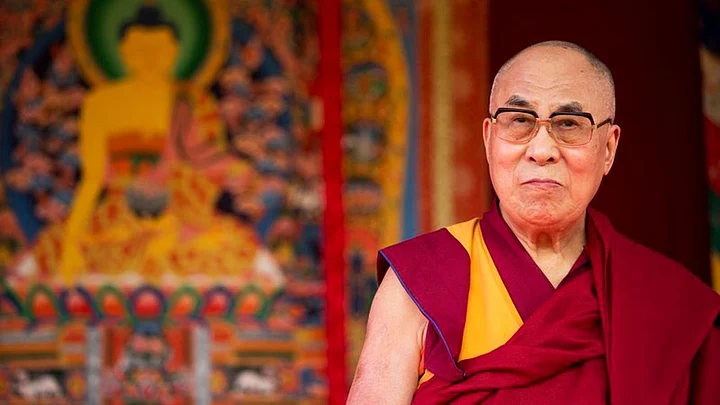This year, China went on a psychological offensive on the 84th birthday of the Dalai Lama regarding the future of latter’s reincarnation.
By exploiting the opportune time of the Nobel peace laureate’s birthday – which draws some degree of media attention, China tried to push its claims on the unique Tibetan tradition of reincarnation to control the selection of the next Dalai Lama in order to consolidate its grip over Tibet.
The focus of the latest Chinese offensive has been in Nepal and in India, which are not only bordering Tibet but also have a significant number of Tibetan refugees as well as followers of Tibetan Buddhism and Tibetan-origin ethnic groups.
In the name of honouring its one China policy, Nepal denied permission to Tibetan refugees as well as its Buddhist population to observe the birthday of the Dalai Lama.
All main areas frequented by Buddhist populace like Boudha in Kathmandu are filled with security forces and Tibetans appearing in traditional Tibetan dress (Chupa) have been stopped and questioned. This is the first time for Nepal to impose a complete restriction against the commemoration of the Dalai Lama’s birthday.
Exerting Influence Over India & Nepal
In India, China cannot push its will the way it does in Nepal. So, it devised a different strategy. However, by using its political and economic influences in Nepal, China had been successful in banning public celebration of the Dalai Lama’s birthday, however this really does not make any significant difference to Nepal’s one China policy. Even in the past, Nepal provided limited space for the Tibetan refugees and its Buddhist population to celebrate the Dalai Lama’s birthday without having any principle of the policy being violated. However, for the present Communist Party-led government taking orders from China to suppress Tibetan activities related or not to the Dalai Lama’s birthday is contingent to Beijing’s favourable response to many projects agreed on between the two nations, including the railway project to Kathmandu which Nepal is desperate to start.
China invited a small group of Indian journalists to Beijing and Lhasa on a carefully choreographed tour, right after the Dalai Lama’s birthday. The timing could not have been coincidental. The journalists came back with the host’s message that they will not accept a Dalai Lama born in a free country and selected according to the Tibetan Buddhist tradition, and that India should stay away from the selection process for it will affect the countries’ bilateral relations.
In another event, some Chinese Army personnel reportedly crossed India’s border on the Damchok side in Ladakh where Tibetan and local Buddhist people celebrated the Dalai Lama’s birthday. While there are different versions to whether the PLA has actually intruded into Indian territory, multiple sources confirmed that China was there to imply its objection to the birthday.
However, given the disputed nature of the border at Damchok, the target of the Chinese move is likely to be New Delhi rather than the locals at the frontier. This was a first for China to connect the border with the Dalai Lama.
Here, Chinese strategists appeared to be connecting the future of the border issue with the selection of the next Dalai Lama – signalling that India’s support for the Dalai Lama will complicate the border dispute and vice versa. This seems to be a classic case of the Chinese’s deceptive strategy to keep New Delhi away from an important development in which it has a lots at stake, given the centrality of Tibet to the territorial disputes and strategic contestation between the two Asian giants along the Himalayan belt stretching from Ladakh in the west to Arunachal in the east of India.
Interestingly, this Himalayan frontier is largely populated by a Buddhist population which regards the Dalai Lama as its spiritual leader. Taking into account the imperatives of the geopolitics of the region and religion at the border, it is in the interest of India that the next Dalai Lama is not controlled by Beijing.
China Wants to Hijack the Reincarnation of the Next Dalai Lama
China has made its intention clear that it wants to hijack the reincarnation of next Dalai Lama purely for its colonial politics in Tibet, like it did with the Panchen Lama.
Nevertheless, it is an inconvenient fact that despite Beijing forcing the imposition of a fake Panchen Lama on Tibetans, its appointee enjoys very little respect among the people. Their longing for the real Panchen Lama, who was kidnapped by China in 1995, remains unwavering. It is through the use of sheer brute force and intimidation that the authoritarian regime can carry out this kind of political gambit inside Tibet, disregarding genuine wishes or religious sentiments of Tibetan and Buddhist people.
Thus, to make sense of China’s latest propaganda offensive against the Dalai Lama, it can be seen to be inspired by Sun Tzu’s strategy of appearing ‘strong when you are weak’. In this context, it is largely psychological warfare in which Beijing makes lots of noise about its right to select the next Dalai Lama, in a language and a manner such that the whole tradition of Tibetan reincarnation system was invented by the nation. The Chinese attempt is to substitute substance with superficial claims and intimidations. However, the absurdity and intensity of Beijing’s blare reflects, its lack of legitimacy, historical or legal, to interfere in the selection of the Tibetan Buddhist lamas in general and particularly that of the Dalai Lama.
(Palden Sonam is part of the China Research Programme at the Institute of Peace and Conflict Studies. Sonam can be reached at palden.sonam@ipcs.org. This is an opinion piece and the views expressed above are the author’s own. The Quint neither endorses nor is responsible for the same.)
(At The Quint, we question everything. Play an active role in shaping our journalism by becoming a member today.)
